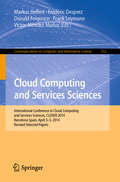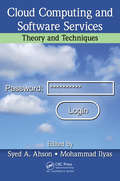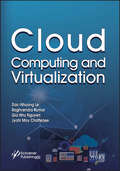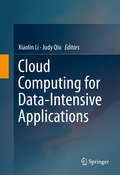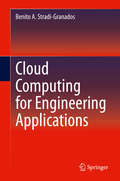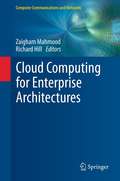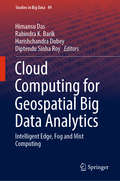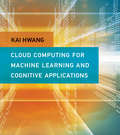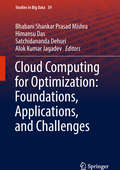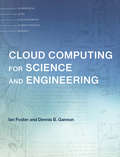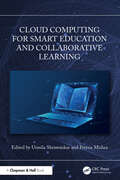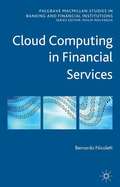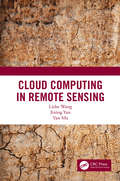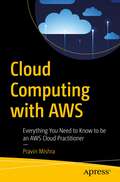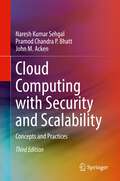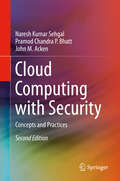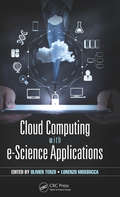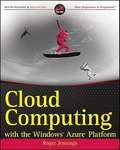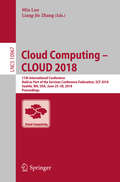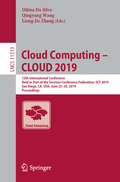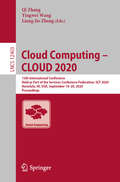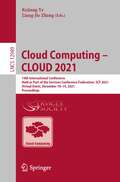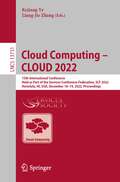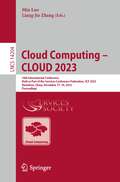- Table View
- List View
Cloud Computing and Services Sciences: International Conference in Cloud Computing and Services Sciences, CLOSER 2014 Barcelona Spain, April 3–5, 2014 Revised Selected Papers (Communications in Computer and Information Science #512)
by Markus Helfert Frédéric Desprez Donald Ferguson Frank Leymann Víctor Méndez MuñozThis book constitutes the thoroughly refereed proceedings of the 4th International Conference on Cloud Computing and Services Science, CLOSER 2014, held in Barcelona, Spain, in April 2014. The 14 papers presented were selected from 127 paper submissions. The papers focus on the following topics: cloud computing fundamentals; services science foundations for cloud computing; cloud computing platforms and applications; cloud computing enabling technologies; and mobile cloud computing services.
Cloud Computing and Software Services: Theory and Techniques
by Mohammad Ilyas Syed A. AhsonWhether you're already in the cloud, or determining whether or not it makes sense for your organization, Cloud Computing and Software Services: Theory and Techniques provides the technical understanding needed to develop and maintain state-of-the-art cloud computing and software services. From basic concepts and recent research findings to fut
Cloud Computing and Virtualization
by Dac-Nhuong Le Raghvendra Kumar Nguyen Gia Nhu Jyotir Moy ChatterjeeThe purpose of this book is first to study cloud computing concepts, security concern in clouds and data centers, live migration and its importance for cloud computing, the role of firewalls in domains with particular focus on virtual machine (VM) migration and its security concerns. The book then tackles design, implementation of the frameworks and prepares test-beds for testing and evaluating VM migration procedures as well as firewall rule migration. The book demonstrates how cloud computing can produce an effective way of network management, especially from a security perspective.
Cloud Computing for Data-Intensive Applications
by Xiaolin Li Judy QiuThis book presents a range of cloud computing platforms for data-intensive scientific applications. It covers systems that deliver infrastructure as a service, including: HPC as a service; virtual networks as a service; scalable and reliable storage; algorithms that manage vast cloud resources and applications runtime; and programming models that enable pragmatic programming and implementation toolkits for eScience applications. Many scientific applications in clouds are also introduced, such as bioinformatics, biology, weather forecasting and social networks. Most chapters include case studies. Cloud Computing for Data-Intensive Applications targets advanced-level students and researchers studying computer science and electrical engineering. Professionals working in cloud computing, networks, databases and more will also find this book useful as a reference.
Cloud Computing for Engineering Applications
by Benito A. Stradi-GranadosThis book explains the use of cloud computing systems for engineering applications to satisfy the need for enterprise level, state-of-the-art computational capacities at an affordable cost. As huge costs are involved in the maintenance and timely renovation of computational capabilities, particularly for projects that require significant computational capacity, cloud services can achieve considerable savings for users and organizations engaged in engineering research and development. Dr. Stradi-Granados explains how to extract a maximum value from every dollar invested in cloud computer server. The types of facilities located around the world that lease their resources to customers interested in reducing the internal overhead and implementation time. The volume features chapters on model generation, motion studies, and prototyping is ideal for students, researchers, practitioners, and facility's managers across a range of engineering domains.
Cloud Computing for Enterprise Architectures (Computer Communications and Networks)
by Zaigham Mahmood Richard HillThis important text provides a single point of reference for state-of-the-art cloud computing design and implementation techniques. The book examines cloud computing from the perspective of enterprise architecture, asking the question; how do we realize new business potential with our existing enterprises? Topics and features: with a Foreword by Thomas Erl; contains contributions from an international selection of preeminent experts; presents the state-of-the-art in enterprise architecture approaches with respect to cloud computing models, frameworks, technologies, and applications; discusses potential research directions, and technologies to facilitate the realization of emerging business models through enterprise architecture approaches; provides relevant theoretical frameworks, and the latest empirical research findings.
Cloud Computing for Geospatial Big Data Analytics: Intelligent Edge, Fog And Mist Computing (Studies in Big Data #49)
by Himansu Das Rabindra K. Barik Harishchandra Dubey Diptendu Sinha RoyThis book introduces the latest research findings in cloud, edge, fog, and mist computing and their applications in various fields using geospatial data. It solves a number of problems of cloud computing and big data, such as scheduling, security issues using different techniques, which researchers from industry and academia have been attempting to solve in virtual environments. Some of these problems are of an intractable nature and so efficient technologies like fog, edge and mist computing play an important role in addressing these issues. By exploring emerging advances in cloud computing and big data analytics and their engineering applications, the book enables researchers to understand the mechanisms needed to implement cloud, edge, fog, and mist computing in their own endeavours, and motivates them to examine their own research findings and developments.
Cloud Computing for Lawyers
by Nicole Black Richard SusskindAs more businesses move their IT systems into the cloud, lawyers need to ask if cloud computing is right for their firm. Cloud Computing for Lawyers features a discussion of cloud computing fundamentals, an overview of legal cloud computing products, and step-by-step instructions for implementing cloud computing in your practice--including practical tips for securing your data.
Cloud Computing for Machine Learning and Cognitive Applications
by Kai HwangThe first textbook to teach students how to build data analytic solutions on large data sets using cloud-based technologies. This is the first textbook to teach students how to build data analytic solutions on large data sets (specifically in Internet of Things applications) using cloud-based technologies for data storage, transmission and mashup, and AI techniques to analyze this data. This textbook is designed to train college students to master modern cloud computing systems in operating principles, architecture design, machine learning algorithms, programming models and software tools for big data mining, analytics, and cognitive applications. The book will be suitable for use in one-semester computer science or electrical engineering courses on cloud computing, machine learning, cloud programming, cognitive computing, or big data science. The book will also be very useful as a reference for professionals who want to work in cloud computing and data science.Cloud and Cognitive Computing begins with two introductory chapters on fundamentals of cloud computing, data science, and adaptive computing that lay the foundation for the rest of the book. Subsequent chapters cover topics including cloud architecture, mashup services, virtual machines, Docker containers, mobile clouds, IoT and AI, inter-cloud mashups, and cloud performance and benchmarks, with a focus on Google's Brain Project, DeepMind, and X-Lab programs, IBKai HwangM SyNapse, Bluemix programs, cognitive initiatives, and neurocomputers. The book then covers machine learning algorithms and cloud programming software tools and application development, applying the tools in machine learning, social media, deep learning, and cognitive applications. All cloud systems are illustrated with big data and cognitive application examples.
Cloud Computing for Optimization: Foundations, Applications, and Challenges (Studies in Big Data #39)
by Bhabani Shankar Prasad Mishra Satchidananda Dehuri Alok Kumar Jagadev Himansu DasThis book discusses harnessing the real power of cloud computing in optimization problems, presenting state-of-the-art computing paradigms, advances in applications, and challenges concerning both the theories and applications of cloud computing in optimization with a focus on diverse fields like the Internet of Things, fog-assisted cloud computing, and big data. In real life, many problems – ranging from social science to engineering sciences – can be identified as complex optimization problems. Very often these are intractable, and as a result researchers from industry as well as the academic community are concentrating their efforts on developing methods of addressing them. Further, the cloud computing paradigm plays a vital role in many areas of interest, like resource allocation, scheduling, energy management, virtualization, and security, and these areas are intertwined with many optimization problems. Using illustrations and figures, this book offers students and researchers a clear overview of the concepts and practices of cloud computing and its use in numerous complex optimization problems.
Cloud Computing for Science and Engineering (Scientific and Engineering Computation)
by Ian Foster Dennis B. GannonA guide to cloud computing for students, scientists, and engineers, with advice and many hands-on examples.The emergence of powerful, always-on cloud utilities has transformed how consumers interact with information technology, enabling video streaming, intelligent personal assistants, and the sharing of content. Businesses, too, have benefited from the cloud, outsourcing much of their information technology to cloud services. Science, however, has not fully exploited the advantages of the cloud. Could scientific discovery be accelerated if mundane chores were automated and outsourced to the cloud? Leading computer scientists Ian Foster and Dennis Gannon argue that it can, and in this book offer a guide to cloud computing for students, scientists, and engineers, with advice and many hands-on examples. The book surveys the technology that underpins the cloud, new approaches to technical problems enabled by the cloud, and the concepts required to integrate cloud services into scientific work. It covers managing data in the cloud, and how to program these services; computing in the cloud, from deploying single virtual machines or containers to supporting basic interactive science experiments to gathering clusters of machines to do data analytics; using the cloud as a platform for automating analysis procedures, machine learning, and analyzing streaming data; building your own cloud with open source software; and cloud security.The book is accompanied by a website, Cloud4SciEng.org, that provides a variety of supplementary material, including exercises, lecture slides, and other resources helpful to readers and instructors.
Cloud Computing for Smart Education and Collaborative Learning
by Urmila Shrawankar Prerna MishraThe book presents next-generation education technology and the pedagogy of the Education Cloud. It covers technological developments, case studies, innovative research approaches, and solutions for advanced learning paradigms using Internet of Things (IoT), cloud computing, and machine learning to handle various challenges of the smart education system. It discusses cloud architecture, management, and frame- work for education from virtual classrooms and labs. It shows how cloud computing framework can be integrated with fog computing, edge computing, deep learning, and IoT. Illustrates from fundamental theories to practical and sophisticated applications of cloud technology for the education domain Explores e-learning applications through location-independent cloud services to reduce cost Covers result-oriented, real-time solutions for smart, accessible education and its real-time application support Discusses accessible cloud services for people with special needs Presents flexible and scalable cost-effective e-learning architecture and scenario for education technology It serves as a valuable resource for academicians, researchers, and professionals interested in smart education and cloud technology.
Cloud Computing in Financial Services
by Bernardo NicolettiFinancial institutions must become more innovative in the conduct of their business. Cloud computing helps to achieve several objectives: innovative services, re-engineered processes, business agility and value optimization. Research, consultancy practice and case studies in this book consider the opportunities and risks with vendor relationships.
Cloud Computing in Remote Sensing
by Lizhe Wang Yan Ma Jining YanThis book provides the users with quick and easy data acquisition, processing, storage and product generation services. It describes the entire life cycle of remote sensing data and builds an entire high performance remote sensing data processing system framework. It also develops a series of remote sensing data management and processing standards. Features: Covers remote sensing cloud computing Covers remote sensing data integration across distributed data centers Covers cloud storage based remote sensing data share service Covers high performance remote sensing data processing Covers distributed remote sensing products analysis
Cloud Computing with AWS: Everything You Need to Know to be an AWS Cloud Practitioner
by Pravin MishraEmbark on a ground-up journey to cloud computing and the Amazon Web Services (AWS) eco-system, including all the other systems, services, and the security associated with it. This book provides you with the practical know-how to become an AWS Cloud practitioner.Your exploration will take you from key fundamentals of identity and access, storage, networking, architectures, databases, security and compute services all the way through to more advanced topics. The book is organized into easy-to-follow and engaging chapters with simple examples to make complex concepts very easy to understand followed by simple step-by-step demonstrations and case studies to make you proficient in every area of AWS. You'll manage databases in your on-prem data centers and set up, operate, and scale relational database in the cloud. All the services and resources taught in this book come from the AWS Free Tier, so you will not have to pay anything to use and learn from this book. What You'll Learn Understand key concepts and benefits of cloud computingEmploy key cloud computing models and services Review the concept of virtual machines in a cloud computing contextStudy compute services that meet your requirementsWho This Book Is ForIT professionals looking to change their domain to cloud computing as well as those who are looking to utilize AWS for their systems and projects.
Cloud Computing with Security and Scalability.: Concepts and Practices
by Naresh Kumar Sehgal Pramod Chandra Bhatt John M. AckenThis book provides readers with an overview of Cloud Computing, starting with historical background on mainframe computers and early networking protocols, leading to current concerns such as hardware and systems security, performance, emerging areas of IoT, Edge Computing, and healthcare etc. Readers will benefit from the in-depth discussion of cloud computing usage and the underlying architectures. The authors explain carefully the “why’s and how’s” of Cloud Computing, so engineers will find this book an invaluable source of information to the topic. This third edition includes new material on Cloud Computing Scalability, as well as best practices for using dynamic cloud infrastructure, and cloud operations management with cost optimizations. Several new examples and analysis of cloud security have been added, including ARM architecture and https protocol.Provides practical guidance for software developers engaged in migrating in-house applications to Public Cloud;Describes for IT managers how to improve their Cloud Computing infrastructures;Includes coverage of security concerns with Cloud operating models;Uses several case studies to illustrate the “why’s and how’s” of using the Cloud;Examples and options to improve Cloud Computing Scalability.
Cloud Computing with Security: Concepts and Practices
by Naresh Kumar Sehgal Pramod Chandra Bhatt John M. AckenThis book provides readers with an overview of Cloud Computing, starting with historical background on mainframe computers and early networking protocols, leading to current concerns such as hardware and systems security, performance, emerging areas of IoT, Edge Computing etc. Readers will benefit from the in-depth discussion of cloud computing usage and the underlying architectures. The authors explain carefully the “why’s and how’s” of Cloud Computing, so engineers will find this book an invaluable source of information to the topic. This second edition includes new material on Cloud Computing Security, Threat Vectors and Trust Models, as well as best practices for a using dynamic cloud infrastructure, and cloud operations management. Several new examples and analysis of cloud security have been added, including edge computing with IoT devices.
Cloud Computing with e-Science Applications
by Olivier Terzo Lorenzo MossuccaThe amount of data in everyday life has been exploding. This data increase has been especially significant in scientific fields, where substantial amounts of data must be captured, communicated, aggregated, stored, and analyzed. Cloud Computing with e-Science Applications explains how cloud computing can improve data management in data-heavy fields such as bioinformatics, earth science, and computer science. The book begins with an overview of cloud models supplied by the National Institute of Standards and Technology (NIST), and then: Discusses the challenges imposed by big data on scientific data infrastructures, including security and trust issues Covers vulnerabilities such as data theft or loss, privacy concerns, infected applications, threats in virtualization, and cross-virtual machine attack Describes the implementation of workflows in clouds, proposing an architecture composed of two layers—platform and application Details infrastructure-as-a-service (IaaS), platform-as-a-service (PaaS), and software-as-a-service (SaaS) solutions based on public, private, and hybrid cloud computing models Demonstrates how cloud computing aids in resource control, vertical and horizontal scalability, interoperability, and adaptive scheduling Featuring significant contributions from research centers, universities, and industries worldwide, Cloud Computing with e-Science Applications presents innovative cloud migration methodologies applicable to a variety of fields where large data sets are produced. The book provides the scientific community with an essential reference for moving applications to the cloud.
Cloud Computing with the Windows Azure Platform
by Roger JenningsLeverage the power of the Azure Services Platform for cloud computingWith the Azure Services Platform, processing and storing data moves from individual corporate servers and Web sites to larger, more reliable, and more secure data centers. Roger Jennings, author of more than 30 books on Microsoft technologies, shows you how to leverage the power of Azure and its related services for cloud computing.The book begins with a look at the differences between cloud computing and application hosting and examines the various issues that .NET developers and IT managers face in moving from on-premise to cloud-based applications, including security, privacy, regulatory compliance, backup and recovery, asset cataloging, and other common technical issues. The author then drills down, showing basic programming for individual Azure components, including storage, SQL Data Services, and .NET Services. He then moves on to cover more advanced programming challenges.Explains the benefits of using the Azure Services Platform for cloud computingShows how to program with Windows Azure components, including Azure Table and Blob storage, .NET Services and SQL AzureAddresses advanced programming challenges of creating useful projects that combine cloud storage with Web applications or servicesCompanion Web site features complete, finished applications that can be uploaded to jump start a Windows Azure projectRoger Jennings clears away the clouds and gets you started using the Azure Services Platform.
Cloud Computing – CLOUD 2018: 11th International Conference, Held as Part of the Services Conference Federation, SCF 2018, Seattle, WA, USA, June 25–30, 2018, Proceedings (Lecture Notes in Computer Science #10967)
by Liang-Jie Zhang Min LuoThis volume constitutes the proceedings of the 11th International Conference on Cloud Computing, CLOUD 2018, held as part of the Services Conference Federation, SCF 2018, in Seattle, WA, USA, in June 2018.The 26 full papers presented together with 3 short papers were carefully reviewed and selected from 108 submissions. They are organized in topical sections such as cloud computing; client-server architectures; distributed systems organizing principles; storage virtualization; virtual machines; cloud based storage; distributed architectures; network services; and computing platforms.
Cloud Computing – CLOUD 2019: 12th International Conference, Held as Part of the Services Conference Federation, SCF 2019, San Diego, CA, USA, June 25–30, 2019, Proceedings (Lecture Notes in Computer Science #11513)
by Qingyang Wang Liang-Jie Zhang Dilma Da SilvaThis volume constitutes the proceedings of the 12th International Conference on Cloud Computing, CLOUD 2019, held as part of the Services Conference Federation, SCF 2019, in San Diego, CA, USA, in June 2019. The 24 full papers were carefully reviewed and selected from 53 submissions. CLOUD has been a prime international forum for both researchers and industry practitioners to exchange the latest fundamental advances in the state of the art and practice of cloud computing, to identify emerging research topics, and to define the future of cloud computing. All topics regarding cloud computing align with the theme of CLOUD.
Cloud Computing – CLOUD 2020: 13th International Conference, Held as Part of the Services Conference Federation, SCF 2020, Honolulu, HI, USA, September 18-20, 2020, Proceedings (Lecture Notes in Computer Science #12403)
by Qi Zhang Liang-Jie Zhang Yingwei WangThis book constitutes the proceedings of the 13th International Conference on Cloud Computing, CLOUD 2020, held as part of SCF 2020, during September 18-20, 2020. The conference was planned to take place in Honolulu, HI, USA and was changed to a virtual format due to the COVID-19 pandemic.The 16 full and 6 short papers presented were carefully reviewed and selected from 49 submissions. They deal with the latest fundamental advances in the state of the art and practice of cloud computing, identify emerging research topics, and define the future of cloud computing.
Cloud Computing – CLOUD 2021: 14th International Conference, Held as Part of the Services Conference Federation, SCF 2021, Virtual Event, December 10–14, 2021, Proceedings (Lecture Notes in Computer Science #12989)
by Liang-Jie Zhang Kejiang YeThis book constitutes the proceedings of the 14th International Conference on Cloud Computing, CLOUD 2021, held online as part of SCF 2021, during December 10-14, 2021.The 6 full papers and 1 short paper presented were carefully reviewed and selected from 25 submissions. They deal with the latest fundamental advances in the state of the art and practice of cloud computing, identify emerging research topics, and define the future of cloud computing.
Cloud Computing – CLOUD 2022: 15th International Conference, Held as Part of the Services Conference Federation, SCF 2022, Honolulu, HI, USA, December 10–14, 2022, Proceedings (Lecture Notes in Computer Science #13731)
by Liang-Jie Zhang Kejiang YeThis book constitutes the proceedings of the 15th International Conference on Cloud Computing, CLOUD 2022, held as part of the Services Conference Federation, SCF 2022, held in Honolulu, HI, USA, in December 2022. The 8 full papers and 1 short paper presented in this volume were carefully reviewed and selected from 15 submissions.The International Conference on Cloud Computing (CLOUD) has been a prime international forum for both researchers and industry practitioners to exchange the latest fundamental advances in the state of the art and practice of cloud computing, identify emerging research topics, and define the future of cloud computing. All topics regarding cloud computing align with the theme of CLOUD.
Cloud Computing – CLOUD 2023: 16th International Conference, Held as Part of the Services Conference Federation, SCF 2023, Shenzhen, China, December 17–18, 2023, Proceedings (Lecture Notes in Computer Science #14204)
by Liang-Jie Zhang Min LuoThis book constitutes the refereed proceedings of the 7th International Conference on Cloud Computing, CLOUD 2023, held in Shenzhen, China, during December 17–18, 2023.The 5 full papers and 3 short papers in this book were carefully reviewed and selected from 13 submissions. The conference facilitates the exploration of emerging research areas and the shaping of the future landscape of cloud computing.
